The Hill’s Morning Report – Presented by Facebook – GOP, Dems jockey for position on police reform

Presented by Facebook
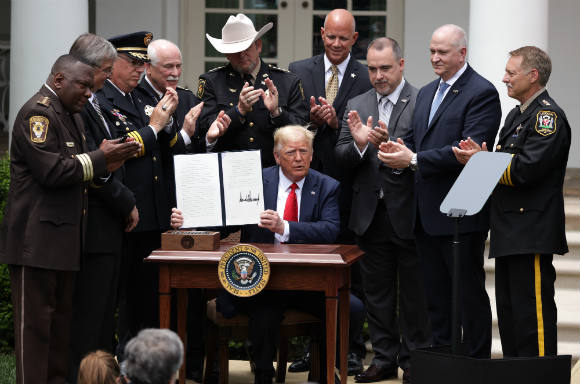
Welcome to The Hill’s Morning Report. It is Wednesday. We get you up to speed on the most important developments in politics and policy, plus trends to watch. Alexis Simendinger and Al Weaver are the daily co-creators, so find us @asimendinger and @alweaver22 on Twitter and recommend the Morning Report to your friends. CLICK HERE to subscribe!
Total U.S. coronavirus deaths reported each morning this week: Monday, 115,732. Tuesday, 116,127. Wednesday, 116,963.
President Trump signed an executive order on Tuesday aimed at police reform, marking the first concrete step taken by the White House following the death of George Floyd as Senate Republicans prepare to roll out a larger package later today.
Trump rolled out the executive order on Tuesday afternoon in the Rose Garden while flanked by members of law enforcement. The measure prioritizes federal funding for police departments that embrace de-escalation tactics, including a ban on chokeholds outside of instances where an officer’s life is in danger. The order also improves the government’s ability to track officers with a history of excessive force complaints.
“Reducing crime and raising standards are not opposite goals,” Trump said in the Rose Garden. “They are not mutually exclusive. They work together. … That is why today I’m signing an executive order encouraging police departments nationwide to adopt the highest professional standards to serve their communities. These standards will be as high and as strong as there is on Earth.”
Before the signing, the president met with a number of families of black Americans killed during interactions with police, saying that he grieved for the tragic deaths. However, he dedicated the majority of his remarks to supporting law enforcement officers “who police our streets and keep us safe.”
The Washington Post: Trump signs police reform executive order that focuses on training, falls short of protesters’ demands.
READ: Trump executive order on safe policing for safe communities.
The executive order went into effect as Senate Republicans, led by Sen. Tim Scott (R-S.C.), prepared to unveil police reform legislation, which has been drafted for more than a week and is set to be released later today. Scott and GOP lawmakers have previewed multiple provisions, including a federal requirement for expanded use of police body cameras moving forward.
The bill will not propose an outright ban on police use of chokeholds, but, would instead leverage federal grant money to achieve compliance. According to Scott, the lone African American Republican in the Senate, the measure is meant to “find a way to target those departments that have not yet banned the chokeholds by taking the money away. We believe that it gets you to the same outcome.”
“The way the bill is designed, it eliminates the possibility for those departments to receive the grants,” Scott said (The Hill).
Appearing on Tuesday on Trevor Noah’s “The Daily Show,” the senator said, “Whether you love President Trump or hate President Trump, I don’t care. If you love Americans, we should be thankful that we’re having this conversation and making some progress in the right direction on an issue that has plagued the African American community in the same fashion that the COVID-19 is plaguing the world. It’s that serious.”
Senate Republicans told reporters they expect to vote on Scott’s legislation — called the JUSTICE Act — by the July 4 recess at the very latest, with the potential for a floor vote as early as next week (The Hill). Senate Majority Leader Mitch McConnell (R-Ky.) indicated he will not negotiate with Democrats before he brings the forthcoming proposal to the floor, saying their choice will be whether to try to block it.
“When we turn to it, I’ll file cloture on the motion to proceed to get to the bill, and at that point the Democrats, I think, have to make a decision: Do they want to prevent this bill from going to the floor, or do they want to get on it and try to change it?” McConnell said when asked if he expects a negotiation between the two sides (The Hill).
McConnell and Scott are scheduled to hold a press conference at 9:30 a.m. to officially release the bill. The proposal will land more than a week after House Democrats proposed a far more sweeping reform measure. The House is expected to vote on its bill next week.
The New York Times: Tim Scott, once quiet on matters of race, embraces key role on police reform.
Ahead of the Senate bill’s release, Speaker Nancy Pelosi (D-Calif.) laced into McConnell for his refusal to consider the House bill, going so far as to invoke his “Grim Reaper” nickname.
“For the leader of the Senate to say it’s going nowhere … is really disgraceful and really ignores the concerns of the American people,” Pelosi told MSNBC on Tuesday. “This isn’t about drawing red lines in the sand. It’s about making a big difference, taking a giant step forward and saying to the leader in the Senate, you call yourself the Grim Reaper. How aptly named you are when you see how many people have died.”
The Hill: Parties collide over police reform.
The Hill: McConnell rejects what he calls a push to “airbrush the Capitol” to remove Confederate statues.
At the city level, a number of police changes have also been proposed. In New York City, Police Commissioner Dermot Shea announced plans to disband the police department’s plainclothes anti-crime units, which target violent crime and have been part of some of the city’s most notorious police shootings (The New York Times).
Baltimore’s police department could see $22 million in budget cuts, which were proposed by the city council, although it remains an open question whether Mayor Jack Young (D) will support the plan (WBAL-TV).
Finally, Atlanta Mayor Keisha Lance Bottoms (D) on Tuesday said her city will change police use-of-force policies and require continuous training so that officers do more to de-escalate situations before consequences become fatal. The mayor, who is a potential vice presidential pick among a list of female contenders, announced her plans after more large protests were touched off by the police killing of another black man, Rayshard Brooks, outside a fast-food restaurant on Friday (The Detroit News).
The Hill: Virginia, once home to the Confederate capital, may become the second state after Texas to celebrate Juneteenth as a state holiday. Juneteenth, or June 19, commemorates freedom for the last remaining American slaves in 1865, in Galveston, Texas.
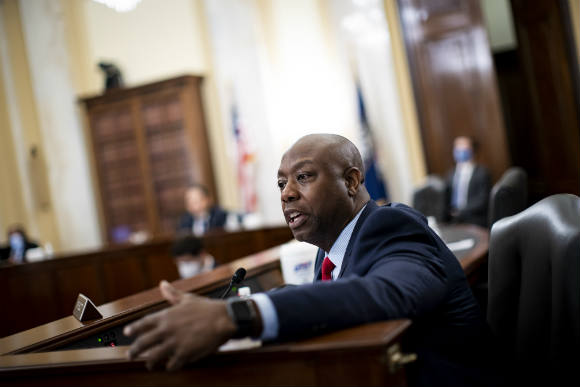
SPONSORED CONTENT — FACEBOOK
Every vote is a voice heard
Facebook is building the largest voter information effort in US history, starting with the new Voting Information Center, where you can find the latest resources about voting in the 2020 election.
LEADING THE DAY
CORONAVIRUS: Dexamethasone, a common and inexpensive steroid, reduces COVID-19 deaths by up to a third, researchers in the United Kingdom reported on Tuesday. It’s potentially the first significant therapeutic breakthrough for patients who are seriously ill with coronavirus infections and hospitalized on ventilators. Steroid drugs reduce inflammation, which sometimes develops in COVID-19 patients as the immune system overreacts to fight the infection. Such overreaction damages lungs and can prove fatal. The findings of the strictly conducted research study will be published in an upcoming journal and clinicians worldwide are eager to see the data (The Associated Press). South Korean scientists expressed caution about the steroid’s potential benefits in advance of studying the published research data (Reuters).
Spikes and responses: Local officials in the United States who want to impose tighter restrictions as coronavirus cases spike in their communities are clashing with GOP governors who won’t let them. In Texas and Arizona, both of which are experiencing surges in coronavirus cases, governors’ orders prevent cities and counties from taking action that is tougher than what has been ordered by the states. The county executive for San Antonio, Texas, wrote a letter to Texas Gov. Greg Abbott (R) on Friday seeking to impose a mandatory mask order, but Abbott refused, saying the move would infringe on personal liberty. In Arizona, the mayor of Tucson said Gov. Doug Ducey (R) tied her hands to respond to a new surge in infections and hospitalizations (The Hill).
Testing: Trump and Vice President Pence, backed by some GOP governors, contend the recent surge in COVID-19 cases in nearly half the states is due to increased testing for the virus. But the testing data contradicts that assertion, and public health experts say the administration’s statements are misleading (The Hill). … How can a simple coronavirus test cost $100 in one lab and 2,200 percent more in another? Answer: The government does not regulate health care prices and labs take advantage when Congress pays the medical bills (The New York Times). … In Washington, D.C., exposure to heat ruined 400 COVID-19 test samples recently collected in the city, officials admitted (The Washington Post).
Contacts untraced: The disease detectives dispatched to find the people who may have been exposed to COVID-19 are having a hard time because people do not answer their phones or return calls. Fighting the spread of COVID-19 relies on significant cooperation from the public, and so far, the results are mixed. In Michigan, contact tracers are connecting with those they need to reach only 60 percent of the time, far short of a 98 percent goal. Louisiana contact tracers reach only about half the people they seek. “I think more and more as a society if you get a phone call from a number you don’t recognize, you don’t answer,” said Marcus Plescia, chief medical officer for the Association of State and Territory Health Officials (The Hill).
International travel: China canceled 60 percent of commercial flights in and out of Beijing on Wednesday because of a new flare-up of COVID-19. Chinese officials called the virus prevention and control situation in the capital “extremely grave” (The Associated Press).
State watch: New York Gov. Andrew Cuomo (D) on Tuesday announced the U.S. Open tournament will be held without tennis fans on hand as a coronavirus precaution. The tournament will be in the New York City borough of Queens from Aug. 31 to Sept. 13 (ESPN). Under U.S. Tennis Association decision making, players will be required to follow rules and precautions that world No. 1 seed Novak Djokovic, a three-time U.S. Open champion, called “extreme” and hinted are a possible deal breaker for his participation (The Washington Post).
> Texas: The Lone Star State hit a new high for coronavirus infections and hospitalizations. The governor on Tuesday urged people to stay home (The Hill).
> Virginia: Gov. Ralph Northam (D) on Tuesday said he is postponing phase three of his state’s planned reopening to gain more time to assess COVID-19 case numbers and nationwide trends that indicate new transmissions and hospitalizations. He said he will describe next steps to Virginians on Thursday (Augusta Free Press).
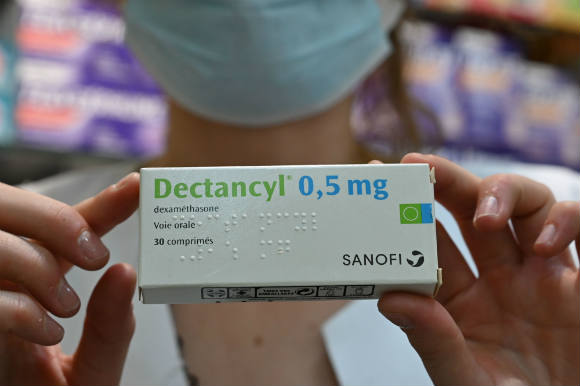
****
CONGRESS: Under any definition of federal and state stimulus spending, constructing roads, bridges, highways and ports is an age-old option that can add new jobs.
Yet another report on Tuesday that Trump is weighing a $1 trillion infrastructure proposal boosted stock markets, even as lawmakers shook their heads with skepticism. “Infrastructure week” has been the butt of Washington jokes since 2017, and commentators believe a bipartisan agreement around any such bill before November is unlikely, especially because the two parties have long disagreed about whether taxpayers or the private sector should foot the bills.
Many economists argue that infrastructure spending has proved to be a jobs multiplier (each $100 billion in infrastructure spending has been estimated to boost job growth by roughly 1 million full-time positions), so the politically appealing concept never dies.
Nonetheless, Republicans in Congress say they are more concerned about passing a five-year Highway Trust Fund reauthorization, The Hill’s Alexander Bolton reports. The price tag is important: Recent rounds of coronavirus relief legislation totaling $3 trillion empowered budget hawks, including Sens. Ron Johnson (R-Wis.) and Pat Toomey (R-Pa.), who wring their hands about rising deficits and debt.
House Transportation Committee ranking member Rep. Sam Graves (R-Mo.): Commonsense infrastructure legislation can help restart our economic engine (The Hill opinion contributor).
> Confederate history: Republicans in Congress face an uphill battle to modify a key provision that would rename Confederate-named military bases (The Hill).
> About-face on tech help for police: Recent interest in facial recognition technology tied to policing could be enough to reignite efforts in Congress to regulate it, after a push appeared to stall early this year. Protests over police brutality and intelligence gathering attracted new scrutiny of the technology. Last week, IBM, Microsoft and Amazon curtailed their sales to police of software that scans faces for identification. More companies may soon follow suit (The Hill).
> Hackers: A House Financial Services subcommittee has rolled out legislative measures to counter a new cyber threat. Hackers are treating financial institutions as prime targets during the COVID-19 pandemic, experts and lawmakers warned on Tuesday (The Hill).
> Ethics probe dropped: The Senate Ethics Committee dismissed an insider trading probe involving Sen. Kelly Loeffler (R-Ga.), who is in a competitive race in November. In a letter, the committee notified the senator on Tuesday that it found “no evidence” she violated the law or Senate rules tied to federal briefings she received about the coronavirus pandemic (The Washington Post).
IN FOCUS/SHARP TAKES
POLITICS: Former Vice President Joe Biden (pictured below in 2018) is making a big play to nab Florida and the state’s 29 electoral votes, putting the president on the defensive in what is an absolute must-have contest for the president to win a second term.
As the number of COVID-19 cases has risen in the state over the past couple of weeks, Biden has loudly attacked Trump over his handling of the pandemic. And as The Hill’s Amie Parnes writes, he has broadened his attack lines when it comes to Florida, assailing the president’s hurricane preparedness ahead of an anticipated active storm season. The former vice president also has a Florida Democrat on his shortlist of potential running mates: Rep. Val Demings, a former chief of the Orlando Police Department.
“He is known as a quantity for Democrats and as the [Trump] campaign has not quite lived up to its billing,” said Martin Sweet, an assistant professor of political science at Florida Atlantic University. “Biden has high name ID among what has become a super-charged electorate. And while COVID-19 has derailed and modified campaigning, Biden’s long history as a senator and VP will help drive voters to the polls.”
In recent polls of the Sunshine State, Biden holds a slim advantage over the incumbent president. According to the latest RealClearPolitics average of polls, Biden leads by 3.4 percentage points.
CBS Philly: “People are hurting here”: Darby, Pa., prepares for Biden visit.
Politico: “It’s a bigger tent”: Trump expands his political cabinet to revive his 2020 prospects.
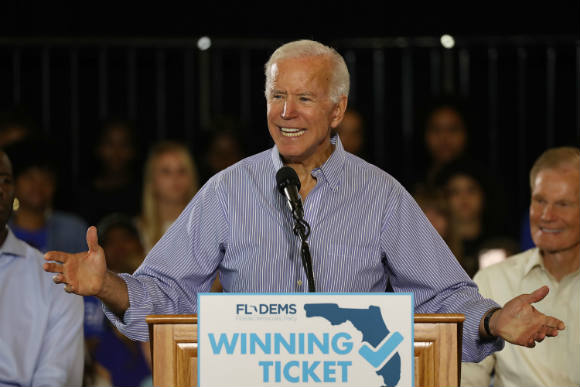
> Tulsa warning: On Saturday, the president’s trademark “Make America Great Again” rallies will return to the 2020 scene for the first time since March despite COVID-19 spikes in many parts of the nation.
As Niall Stanage writes in his latest Memo, Trump’s decision worries some public health experts. The president’s allies accuse the news media of hypocrisy in their editorial support for Black Lives Matter protesters, who congregated shoulder to shoulder and were also exposed to COVID-19 risks.
Trump also faces new perils in terms of the broader picture on the coronavirus. Approximately 20 states have seen COVID-19 cases rise in the last week — a list that includes three potential battlegrounds in November (Florida, Georgia and North Carolina). New shutdowns could hurt an already-battered economy even more. They could also raise more fundamental questions about Trump’s leadership — especially if his rhetorical push for states to reopen comes to be widely viewed as a mistake.
Reid Wilson, The Hill: How campaigns are adjusting to COVID-19.
The Associated Press: Nebraska Democrats renounce their Senate pick over comments.
The Morning Report is created by journalists Alexis Simendinger and Al Weaver. We want to hear from you! Email: asimendinger@digital-staging.thehill.com and aweaver@digital-staging.thehill.com. We invite you to share The Hill’s reporting and newsletters, and encourage others to SUBSCRIBE!
OPINION
The Supreme Court’s decision on LGBTQ protections shows the conflicting ideas of textualism, by George F. Will, columnist, The Washington Post. https://wapo.st/2YE2SXG
Our lockdowns are not deadlier than the disease, by Tracy Mayne and Jeremy Mayer, opinion contributors, The Hill. https://bit.ly/3d8phBJ
SPONSORED CONTENT — FACEBOOK
How Facebook is preparing for the US 2020 election
— Tripled safety and security teams to 35,000 people
— Implemented 5-step political ad verification
— Providing greater political ad transparency
— Launching new Voting Information Center
Learn about these efforts and more.
WHERE AND WHEN
The House will meet for a pro forma session on Thursday at 10 a.m.
The Senate convenes at 10 a.m. and resumes consideration of the Great American Outdoors Act.
The president at 2 p.m. will highlight the administration’s efforts to prevent veteran suicides (Stars and Stripes).
Federal Reserve Chairman Jerome Powell will testify about the state of the economy before the House Financial Services Committee at noon.
The American Film Institute hosts its annual documentary film festival beginning today through Sunday, and this year it’s virtual. The public can “unlock” more than 50 documentaries by paying for a single ticket or a screening pass to watch multiple films from home, or access festival “forum events” for a fee. Information about options is HERE. A guide to the films by category and country is HERE. One timely feature doc: “Women in Blue,” directed by Deirdre Fishel, about Minneapolis’s first and former female police chief, Janeé Harteau, as she sought to reform the department by “getting rid of bad cops, retraining the rest and promoting women.”
The Hill’s Coronavirus Report has updates and exclusive video interviews with policymakers emailed each day. Sign up HERE!
Hill.TV’s “Rising” program features news and interviews at http://digital-staging.thehill.com/hilltv or on YouTube at 10:30 a.m. ET at Rising on YouTube.
ELSEWHERE
➔ Bolton sued: The Trump administration filed a lawsuit on Tuesday seeking to prevent former national security adviser John Bolton from publishing his memoir next week describing his 17 months in the White House. The lawsuit, filed in the U.S. District Court for the District of Columbia, alleges that Bolton’s book, set for a June 23 release, contains classified information that could compromise national security if published before a government review is completed. The lawsuit seeks a court order to Simon & Schuster, the book’s publisher, to “retrieve and dispose of” any copies held by third parties. According to Bolton’s attorney, the book does not contain classified material (The Hill).
➔ Federal Reserve: The chairman of the nation’s central bank said Tuesday that full U.S. recovery from the recession is unlikely until the coronavirus is contained. Testifying before the Senate Banking Committee, Powell also warned that the collapse of small businesses that have few financial resources to weather an extended downturn could deeply harm the economy and society. “If a small or medium-sized business becomes insolvent because the economy recovers too slowly, we lose more than just that business. These businesses are the heart of our economy and often embody the work of generations,” he said. The chairman will repeat his semi-annual testimony before the House Banking Committee today (The Hill).
➔ 2018 California fire: Utility Pacific Gas & Electric (PG&E) pleaded guilty on Tuesday to 84 felony counts of manslaughter stemming from 85 total deaths in the Northern California fire in 2018, which was sparked by neglected PG&E equipment. The most destructive and deadly fire in the state’s history, which blazed through the town of Paradise, also destroyed more than 153,000 acres. PG&E is approaching the end of a complicated bankruptcy case it used to work out $25.5 billion in settlements to pay for damages. A federal judge will decide whether to approve PG&E’s plan for getting out of bankruptcy by June 30 (USA Today).
➔ Entertainment: The Emmys announced Tuesday that Jimmy Kimmel will host the annual TV awards ceremony, but the ceremony’s format on Sept. 20 remains up in the air because of the coronavirus. “I don’t know where we will do this or how we will do this or even why we are doing this, but we are doing it and I am hosting it,” Kimmel, the host of ABC’s “Jimmy Kimmel Live” said in a statement. The Emmys will be the first awards show to go forward since the start of the pandemic. On Monday, the 93rd Academy Awards were pushed back from February to April (The Associated Press).
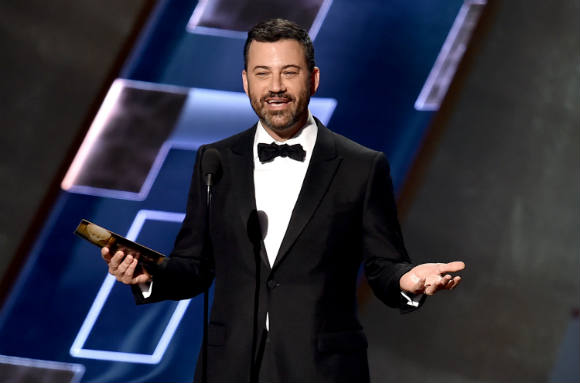
THE CLOSER
And finally … On this day in 1885, the dismantled Statue of Liberty arrived in New York Harbor, welcomed by hundreds of thousands of spectators who wanted to see France’s iconic gift of friendship to the United States (History). The robed woman holding a torch aloft was reassembled from 300 individual pieces of copper and iron and dedicated in an elaborate ceremony the following year, with then-President Cleveland in attendance.
Even in far-away Iola, Kan., the front page of The Iola Register newspaper used pen and ink drawings of the statue with the headline “Liberty’s Light” to describe the 1886 New York dedication, which included a parade of 30,000 revelers.
Through economic wreckage, terror attacks, pandemics and protests, Lady Liberty is a survivor.
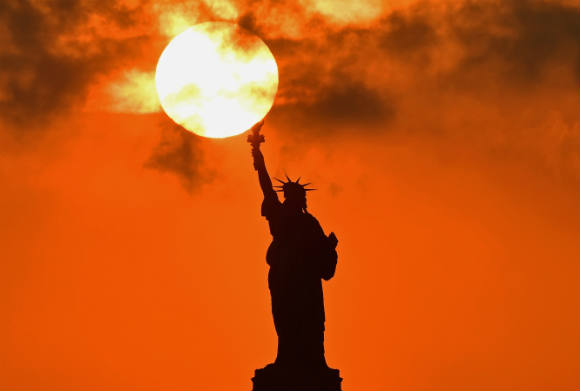
Copyright 2024 Nexstar Media Inc. All rights reserved. This material may not be published, broadcast, rewritten, or redistributed..









